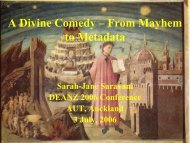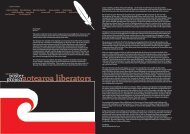How does Cultural Capital operate in Grunge music, and does this ...
How does Cultural Capital operate in Grunge music, and does this ...
How does Cultural Capital operate in Grunge music, and does this ...
You also want an ePaper? Increase the reach of your titles
YUMPU automatically turns print PDFs into web optimized ePapers that Google loves.
7“ (Be-Bop is) a reliable repertoire of st<strong>and</strong>ard tunes, as well as newer „classics‟ writtenwith<strong>in</strong> the same genre, provide a set of melodies <strong>and</strong> chord changes which are thensubjected to variative test<strong>in</strong>g by improvis<strong>in</strong>g soloists.” (Toynbee, 2000, p.107)In apply<strong>in</strong>g <strong>this</strong> to the case of grunge, it seems safe to assume that the field is moreoften than not dictated by the habitus.There are common traits associated with the b<strong>and</strong>s we now refer to as <strong>Grunge</strong> that helpedto unite them <strong>in</strong>to the genre <strong>and</strong> def<strong>in</strong>e the field. There are many examples, fromideologies as discussed above, to image, to the actual similarities <strong>in</strong> the sonic elements oftheir <strong>music</strong>.One example of a non-<strong>music</strong>al trait which the b<strong>and</strong>s associated with <strong>this</strong> genre have<strong>in</strong> common is their lack of theatrics, costum<strong>in</strong>g <strong>and</strong> enthusiasm. As Kurt Coba<strong>in</strong> ofNirvana <strong>and</strong> others have said <strong>in</strong> <strong>in</strong>terviews, much of <strong>this</strong> was a purposeful reaction to thegenre that was popular at the time (Now known as Glam Metal/Hair Metal), which wasexceed<strong>in</strong>gly theatrical, <strong>and</strong> over the top <strong>in</strong> its aesthetic.”Some of the work<strong>in</strong>g class appeal of these artists <strong>and</strong> their anti-popular culture stancecould be said to rem<strong>in</strong>iscent of the then fad<strong>in</strong>g punk scene which was popular <strong>in</strong> Seattledur<strong>in</strong>g the late 1970s” (Anderson, 2007, p73)So by practic<strong>in</strong>g these same methods <strong>and</strong> adopt<strong>in</strong>g the ideologies <strong>does</strong> that meanthat by default the artist <strong>in</strong> question would be operat<strong>in</strong>g with<strong>in</strong> the field of <strong>Grunge</strong>?The other aspect to Bourdieu‟s theory that becomes relevant <strong>in</strong> <strong>this</strong> case is the idea of„Likelihood of possibles occurr<strong>in</strong>g‟ with<strong>in</strong> the radius of the chosen field. This isparticularly a problem <strong>in</strong> relation to geographical <strong>and</strong> historical components to amovement such is <strong>this</strong>, because as we are work<strong>in</strong>g with Toynbee‟s approach also, thatgenre is what is align<strong>in</strong>g the Habitus <strong>and</strong> Field (<strong>and</strong> that they are already associated witheach other) then it would be assumed that location <strong>and</strong> time period are a part of theHabitus <strong>and</strong> therefore the „Likelihood‟ would not be as high for a work to be created <strong>in</strong>
8the field would not be as high outside of these constra<strong>in</strong>ts, <strong>in</strong> which case Field <strong>and</strong> genrewould become one <strong>and</strong> the same. The real question then lies not with<strong>in</strong> the ability to<strong>operate</strong> with<strong>in</strong> a genre, but what is required to be authentically operat<strong>in</strong>g with<strong>in</strong> thatgenre <strong>and</strong> the culture surround<strong>in</strong>g it.THE AUTHENTICIY OF CULTUREIn the words of Pierre Bourdieu:“ Avante Garde culture is (achieved by) reject<strong>in</strong>g the generic, common, easy <strong>and</strong>immediately accessible “ (Bourdieu, 1984 p.32)In many ways <strong>this</strong> statement is applicable to most genres of <strong>music</strong> where the ideology ofanti-ma<strong>in</strong>stream is promoted, however it is a particularly ironic statement when appliedto the genre of <strong>Grunge</strong>.Accord<strong>in</strong>g to Bourdieu‟s philosophy, it is when Avante Garde culture becomes popularculture that another movement will form as a reaction. The irony occurs when we apply itto a culture that surrounds such a large <strong>and</strong> popular ma<strong>in</strong>stream <strong>music</strong> movement,because one of the general features of the „Avante Garde‟ is that is rejects the “generic,common <strong>and</strong> easily accessible” (Bourdieu, 1984)<strong>Grunge</strong> seems to do <strong>this</strong> with examples like Nirvana‟s „Radio Friendly UnitShifter‟ while still be<strong>in</strong>g extremely popular, <strong>and</strong> easily accessible.“With lyrical concepts often tackl<strong>in</strong>g topics such as topics such as Rape, violence,depression <strong>and</strong> mental illness <strong>and</strong> contrast<strong>in</strong>g <strong>this</strong> with often upbeat <strong>music</strong>, whichprovided a specific type of irony <strong>and</strong> desensitization to these subjects.” (2007,Andersonp.47)<strong>Grunge</strong> did not <strong>in</strong>vent the ideas of drug use <strong>and</strong> self- destruction, but it certa<strong>in</strong>lyhelped disassociate drugs like hero<strong>in</strong> with the glamorous rock star image <strong>and</strong> re-
10style will be measured by the extent to which it is an expression of grass-roots values <strong>and</strong>identity.” (Toynbee, 2000,p.110)This mean<strong>in</strong>g the culture surround<strong>in</strong>g the given genre of <strong>music</strong> is often firmly bound (as<strong>in</strong> the case of grunge) to Avante Garde.Frith argues that <strong>this</strong> position is developed most completely <strong>in</strong> rock ideology, <strong>and</strong> that itis just <strong>and</strong> ideology (see pg 2 for quote), it „Fetishizes‟ community, <strong>and</strong> <strong>does</strong> notpublically acknowledge its commercial nature, because for an artist operat<strong>in</strong>g <strong>in</strong> the genreto do so, it would then void them of certa<strong>in</strong> cultural values associated with the genre,mak<strong>in</strong>g their work seem less authentic to those <strong>in</strong>volved with<strong>in</strong> the scene.THE INEVITABILITY OF GENRE CLASIFICATION AND THE AUTHENTICITYDILEMMASo <strong>in</strong> that case it would seem that the artists operat<strong>in</strong>g with<strong>in</strong> the culture are <strong>in</strong> someaspect, the least aware of the cultural capital they are generat<strong>in</strong>g. Of course there arecases as <strong>in</strong> any genre of „Cash<strong>in</strong>g <strong>in</strong>‟ <strong>and</strong> „Sell<strong>in</strong>g out‟ where the artist is well aware ofthe situation, but it is difficult to say whether <strong>in</strong> the case of the grunge movement, theculture itself may have been created or adapted heavily by any outside sources.None of the theories or means of analysis I have previously discussed take <strong>in</strong>toconsideration the perform<strong>in</strong>g artist.The listener has the ability not only to classify the artist <strong>in</strong>to a certa<strong>in</strong> genre but to judge ab<strong>and</strong>s authenticity with<strong>in</strong> that genre.Ausl<strong>and</strong>er states that live performance enables the determ<strong>in</strong>ation of authenticity.“Only <strong>in</strong> live performance when the listener can ascerta<strong>in</strong> that a group which looksauthentic <strong>in</strong> photographs, <strong>and</strong> sound authentic on records, really is authentic <strong>in</strong> terms ofrock ideology.” (Ausl<strong>and</strong>er, 2006, p.90)
11In the case of grunge, <strong>this</strong> is particularly relevant, fans would perceive a b<strong>and</strong>‟s „level ofgrunge‟ not only by their ideologies <strong>in</strong> their lyrics <strong>and</strong> the way they sounded, but also bytheir aesthetic <strong>and</strong> the way <strong>in</strong> which they dressed <strong>and</strong> performed; the obvious examplebe<strong>in</strong>g a lack of theatrics <strong>and</strong> costum<strong>in</strong>g. (Anderson, 2007)<strong>How</strong>ever journalists <strong>and</strong> critics seem to have as much sway as the fans <strong>in</strong>volved with thecultural movement themselves, as Kyle Anderson states <strong>in</strong> his book AccidentalRevolution – the story of <strong>Grunge</strong>, the term „<strong>Grunge</strong>‟ was co<strong>in</strong>ed by small-time journalistsassociated with the „Subpop scene‟ as a method of describ<strong>in</strong>g the sound.Journalists <strong>and</strong> reviewers certa<strong>in</strong>ly have the power to change the perception of ab<strong>and</strong>‟s authenticity. A textbook example of <strong>this</strong> can be observed when research<strong>in</strong>garticles <strong>and</strong> <strong>in</strong>terviews with Nirvana <strong>and</strong> Kurt Coba<strong>in</strong>. Be<strong>in</strong>g analyzed as the most <strong>in</strong>authentic<strong>and</strong> ma<strong>in</strong>stream b<strong>and</strong> of the <strong>Grunge</strong> movement <strong>in</strong> the 1990s (as discussedabove), with many <strong>in</strong>volved <strong>in</strong> the grunge culture argu<strong>in</strong>g that their <strong>music</strong> lackedauthenticity, post-grunge movement research <strong>in</strong>to articles <strong>and</strong> reviews about the b<strong>and</strong>seem to reveal evidence that Nirvana, rather than be<strong>in</strong>g considered fake <strong>and</strong> <strong>in</strong> authenticas they were at the peak of their success, are now idolized as the face of the grungemovement.“The <strong>music</strong> conta<strong>in</strong>s with<strong>in</strong> itself a pre-exist<strong>in</strong>g truth, <strong>and</strong> that it is the task of bothperformer <strong>and</strong> audience to rediscover <strong>and</strong> re-express that truth.” Writes an unknownauthor <strong>in</strong> reference to Nirvana on a blog site entitled „Rock <strong>and</strong> Authenticity‟Journalist Steve Jones Def<strong>in</strong>es authenticity as one of the “Most Prevalent themes <strong>in</strong>popular <strong>music</strong> criticisms” (Jones, 1995, p.2) up alongside racism/urban culture <strong>and</strong> massculture.Many journalists seem to romanticize Kurt Coba<strong>in</strong>‟s death as the end of the <strong>Grunge</strong>Movement. Thus seem<strong>in</strong>gly, Nirvana‟s <strong>music</strong>al association with the term grunge seemsto have become more authentic post 1994 (Coba<strong>in</strong>‟s suicide)Everet True States <strong>in</strong> his 1996 book „Nirvana, the true story‟
15Bibliography:Books1. Anderson,Kyle (2007) Accidental Revolution- The story of grunge. New York,U.S.A:St Mart<strong>in</strong>‟s Press2.Ausl<strong>and</strong>er,Philip (2008) Liveness: performance <strong>in</strong> a mediatized culture. U.K,Routledge.3. Bannister,Matthew (2006)White Boys, white noise :Mascul<strong>in</strong>ities <strong>and</strong> 1980s IndieGuitar Rock. N.Z:Ashgate Publish<strong>in</strong>g Ltd.4.Bourdieu,Pierre (1984) A Social Critique of the Judgement of Taste. Translated:Richard Nice (1984) London: Routledge <strong>and</strong> Kegan Paul5.Bourdieu, Pierre (1984) The Forms of <strong>Capital</strong>,U.K, Greenwood Press6.Brabazon,Tara(2005) Revelution to Revelation: Generation X,Popular Memory <strong>and</strong><strong>Cultural</strong> Studies.Engl<strong>and</strong>. Ashgate Publish<strong>in</strong>g.7.Foucault,M , Gordon, C (1980) Power/Knowledge: Selected Interviews <strong>and</strong> otherwrit<strong>in</strong>gs, 1972 – 1977. U.S.A.Pantheon.8.Frith, Simon (1998) Perform<strong>in</strong>g rites:on the value of popular <strong>music</strong>.U.S.A, HarvardUniversity Press.9.Frith,Simon (2007) Tak<strong>in</strong>g Popular Music Seriously .Engl<strong>and</strong> :Ashgate Publish<strong>in</strong>gLtd.10.Gaar,G,Gillian (1992) She’s a Rebel:The history of Women <strong>in</strong> Rock <strong>and</strong>Roll.U.S.A.Seal Press.11.Spears,Russell. (1997) The social Psychology of stereotyp<strong>in</strong>g <strong>and</strong> group life.Oxford,U.K :Blackwell publishers12.Toynbee, Jason (2000) Mak<strong>in</strong>g Popular Music, Musicians, Creativity <strong>and</strong> InstitutionsLondon,Engl<strong>and</strong>:Arnold13.True,Everett (2006) Nirvana,the true story.U.K:Omnibus Press.
17Film28.Pray,Doug (Director). (1996).Hype!:Surviv<strong>in</strong>g the Northwest Rock Explosion .(DVD)U.S.A.Helvey/Pray Productions.Websites/<strong>in</strong>ternet (Retrieved between 11/08/2010 <strong>and</strong> 03/11/2010)http://www.michel-foucault.com/gallery/pictures/foucault02.html.http://jls.sagepub.com/content/16/3/251.abstracthttp://www.michel-foucault.com/concepts/<strong>in</strong>dex.htmlwww.mtv.comwww.kurtcoba<strong>in</strong>.comRock <strong>and</strong> Authenticity Bloghttp://www.sauer-thompson.com/junkforcode/archives/2006/06/rock_authentici.htmlhttp://en.wikipedia.org/wiki/Steve_alb<strong>in</strong>ihttp://en.wikipedia.org/wiki/Soundgardenhttp://www.subpop.com/http://www.czrecords.com/
















